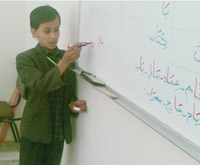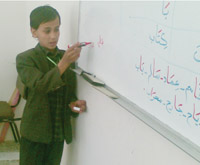
Yemeni child laborers, a culture of forced maturity [Archives:2008/1147/Reportage]
April 17 2008
 |
“I sell socks in Al-Saba'een Park,” explains 10-year-old Fawaz Mohammed, who works with his five brothers to provide food for their family. Questioned about their father, Fawaz replied, “My father doesn't work – we do.”
Fawaz is one of two million Yemeni children forced to act as adults before their time in order to help their families. However, work isn't the only cause of such premature adulthood. Early marriage and the added responsibilities of caring for younger siblings also are causing Yemeni children to grow up too fast.
“The sooner children grow up, the better is a common false perspective in our society and it affects children, which in turn will affect the way these children raise their own children when they grow up” says Fawziyah Omar, a social expert at Al-Furat public school in Sana'a.
Sana'a University social science professor Qaid Al-Sharjabi agrees, pointing out that childhood is the only period of our lives when we have no responsibility. Children have freedom during this time, which is what helps them enjoy this period. “When a portion of their childhood is taken from them, they face physiological problems later that are difficult to heal,” he added.
Children's center seeks to lessen psychological burdens
Fawaz attends the Working Children's Rehabilitation Center in Sana'a, which was founded in 2003 as one of the few places where working children actually can experience their childhood and receive the special care they need. They study math, Arabic and other subjects at the center in order to catch up with their school peers.
Other children who come to the center aren't as lucky as Fawaz. Because they don't attend school, these children instead attend illiteracy classes in which they're taught to read and write, in addition to other basic skills that may help them in their future careers.
Ten-year-old Gamar Abdu used to sell ice cream at Al-Saba'een Park, but nowadays, Gamar prefers drawing. Her most recent work features a picture of a girl saying, “I have the right to participate in Parliament.” With a shy smile, Gamar says she desires to enter a drawing contest and win first prize.
“Gamar stopped working after coming to us,” explains Safiyah Al-Sa'eedi, director of the Working Children's Rehabilitation Center, pointing out that hers is a rare case and one of the few who stopped working after coming to the center.
Typically finding children in the marketplaces, the center requests they fill out an application, after which one of its representatives then speaks with the child's parents to convince them to do what's best for their children – allowing them to stop working and return to school.
The center offers remedial classes in all basic subjects, illiteracy classes, preschool classes and vocational handcraft training classes. In addition to rehabilitating children, the center also has a program to support their families by helping them initiate small business projects. So far, 25 families have benefited from this program. Overall, more than 1,000 children have benefited from the center's programs, according to its 2007 report.
“Many of us believe that parents force their children to work due to a certain perspective in Yemen that says children should take responsibility and become 'man enough.' The problem is mainly due to uneducated parents who think that treating their children this way is what's best for them,” Omar explains.
But Al-Sa'eedi has a different view. “Many parents would love for their children to attend school and play like normal kids, but it's very hard to convince them to stop their children from working because it's sometimes a matter of survival that every family member works – including the children,” she notes.
Al-Sharjabi agrees and believes that need is what drives parents to send their children to work, nothing else. However, some parents undoubtedly blur the line between teaching their children the value of responsibility and forcing them to act like adults.
Omar points out that she's met young girls who have stated that they would hate to have their own children when they grow up due to the responsibility of having to care for their little brothers and sisters while their mothers go out to spend time with friends.
Al-Sa'eedi mentions that due to the large amount of responsibilities of those children attending the center, they change psychologically in several ways. For instance, some become prematurely adult in order to bear their responsibilities, but face severe mental depression, while others stop noticing what's occurring around them.
“These are the type of children we worry about the most,” Al-Sa'eedi notes, “Finding no love at home, they seek it elsewhere and as a result, they become easy targets for manipulators.”
Like Fawaz, 11-year-old Hakimah sells socks in Al-Saba'een Park, but loves going to the center. “I want my little sister to come here and study because I hope she won't have to work like me.”
Working children have special talents
Despite their tough jobs and their poverty, these working children still hope for a bright future. What's surprising about the children at the center is that, unlike many non-working students, the library, art studio and handcraft classes are filled with eager children, even after that class time has ended. As a case in point, Gamar and her sister refuse to leave until completing their paintings.
“These children needing special care reveal more talent than ordinary children,” Al-Sa'eedi notes, adding that they are very motivated and have a lot of energy and creativity.
Abeer Abdullah, a 14-year-old student at the center, proudly states that she won the local children's council election representing the center and her friends, adding that she earns money after school by painting the faces of other children in the parks.
The center's future
According to its director, the center is struggling to stay afloat financially but remains open thanks to money saved last year. “We were made promises, but so far, we've seen nothing,” Al-Sa'eedi said regarding the program's funding.
She notes that it would be like returning to square one if the center ceased operating even for a year, warning, “These children who have worked so hard to improve themselves will fall back into their previous situations and that will be a big loss for us all.”
——
[archive-e:1147-v:18-y:2008-d:2008-04-17-p:report]


